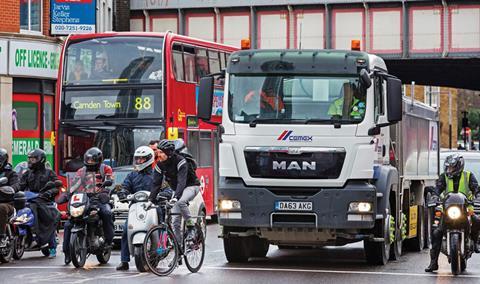
Transport for London has been accused of opportunism after mayor Sadiq Khan announced that it would reintroduce all road charging schemes from Monday (18 May).
The FTA said the decision threatened the green shoots of recovery across the Capital’s economy and jeopardized many logistics firms as they attempted to claw their way out of the crisis.
Khan said he wanted to transform London into “one of the largest car-free zones” in the world and some of its streets would be converted into walking and cycling only zones.
He said streets between London Bridge and Shoreditch, Euston and Waterloo and Old Street and Holborn may become limited to buses and pedestrians.
He added that while access to emergency services and disabled people would be maintained, “deliveries on some streets may need to be made outside of congestion charging hours”.
Khan’s plans include the immediate reintroduction of the congestion charge and the Ultra Low Emission Zone.
In addition, the congestion charge is to increase “temporarily” to £15 from next month and the hours of operation extended.
But the FTA said cash-strapped operators will struggle to recover from Covid-19 with additional charges to contend with: “The proposed changes to the London congestion charge have completely ignored the needs of London’s businesses – how are shops to be supplied, restaurants and cafes to be stocked and the rest of the capital’s economy to obtain the products it needs when those charged with delivering these needs are to be punitively taxed at a time when their own industry is in recovery?” said Natalie Chapman, FTA head of urban policy.
“Logistics, like the rest of London, is far from back to ‘business as usual’, and the Capital’s supply chain should be exempt from these charges.”
The RHA branded the timing of the move as “shockingly nonsensical” and accused the mayor of ignoring the economic impact the pandemic was having on hauliers.
Richard Burnett, RHA chief executive, said: “It’s incredibly late notice and far too early to re-impose crippling levies when firms are trying to salvage what’s left of their businesses.
“The economy will only recover with pragmatic political leadership at national and local levels clearing away the hurdles to help businesses back on their feet.”
The trade association said it also had concerns about the mayor’s plans to reallocate road space and the impact this would have on firms making deliveries.
Added BVRLA chief executive Gerry Keaney: “The timing of this is the issue. Both central government and local authorities across the UK are currently digging deep to support businesses through this crisis. Now is not the time to hit people with extra costs at short notice.
“The government is looking to industry to kickstart the economy and the decision to reintroduce and increase charges to drivers and fleet operators risks stifling businesses who are doing their best to keep on with the important job of transporting people and goods across the capital.
“We would have preferred to have seen a continuation in the suspension of charges to give businesses more time to get on their feet. More notice would have also been welcomed as this will hit commercial vehicle operators particularly hard."













